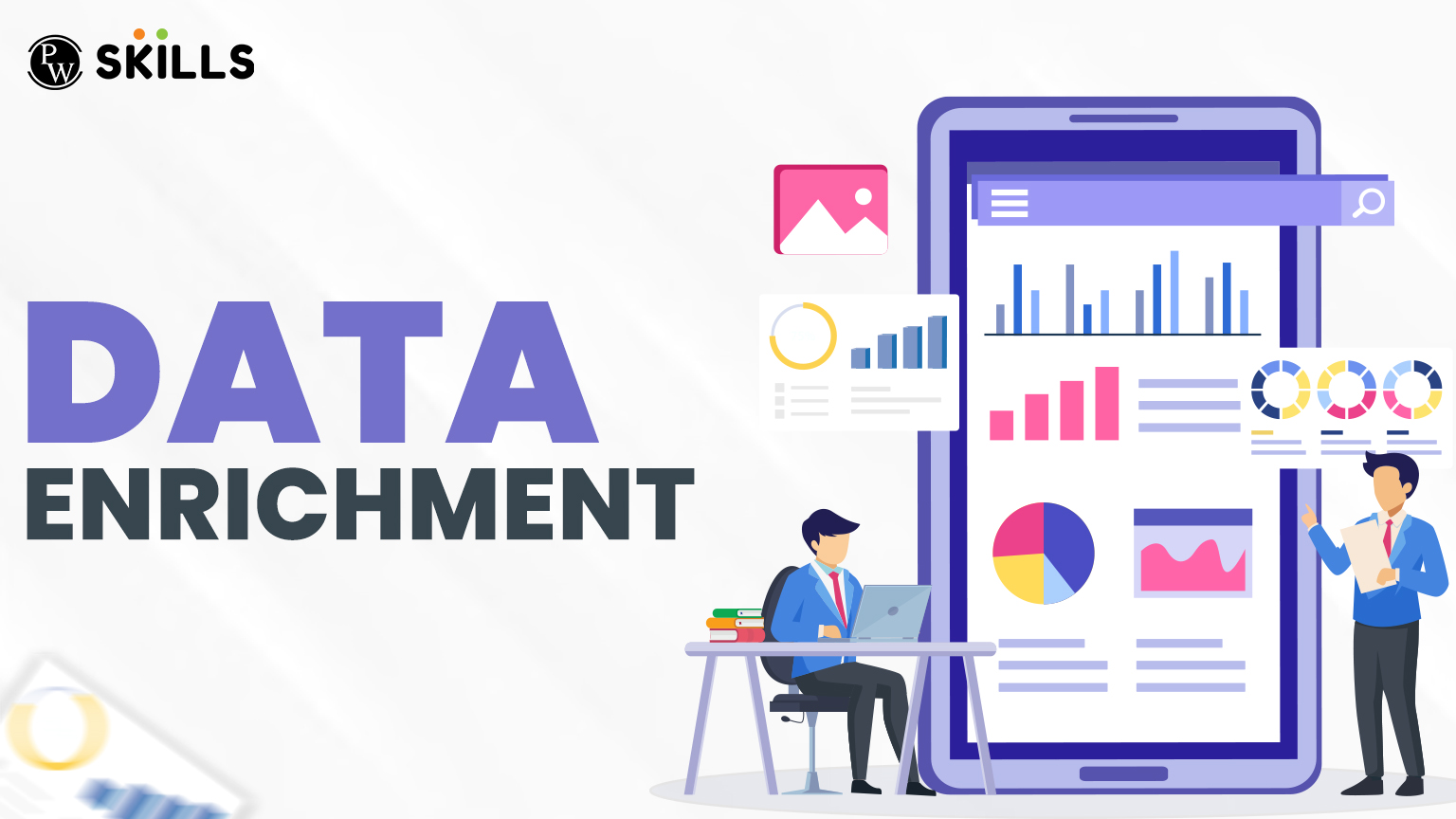In a world where data drives every prospect of existence, high-quality data is paid utmost attention to when decisions are made. Therefore, datafication of information-the Data Enrichment Certification-is no longer an option but a compulsion to the students and working professionals who aspire to loftily know how to pivot raw data to actionable insights. Market types for data enrichment include customer profiles, marketing, and sales performance.
This guide will encompass anything and everything on data enrichment, including its definition, steps, advantages, and best practices. Various types of data enrichment such as geographic data enrichment and behavioral data enrichment will also be discussed so that the right choice can be made. After that, you should know why obtaining a Data Enrichment (DE) Certification will give you an edge in the job market.

What Is Data Enrichment (DE)?
DE is the process of enhancing the raw data by adding the missing info, correcting the errors, and incorporating external sources to elevate its quality and utility. For instance, a basic customer database may have bundled names and email addresses, but once the process of data enrichment is embraced, it may consider adding parameters like phone numbers, job titles, purchase histories, and even geographic data enrichment with location-based-insight.
People who hold a Data Enrichment Certification know how to radically change a somewhat complete dataset into a most valuable one. Hence, this process finds its use most commonly in marketing, sales, customer support, and business intelligence. Armed with data enrichment information, organizations can build personalized customer experiences, optimize campaigns, and govern better decisions.
![]() Join Our Data Analytics Telegram Channel
Join Our Data Analytics Telegram Channel
![]() Join Our Data Analytics WhatsApp Channel
Join Our Data Analytics WhatsApp Channel
Types of DE
Data enrichment is not a one-type-fits-all process; there are different forms of data enrichment for different business requirements. Whether you want to build better customer profiles, set up a marketing campaign, or improve your logistics, understanding these differences will certainly help you. A Data Enrichment certification will arm you with all the skills to apply the techniques of enrichment that fit any given case.
Here, we list the most common types of data enrichment: geographic data enrichment, behavioral data enrichment, and other types. Each has its purpose in helping businesses obtain the greatest value from their data.
-
Geographic DE (Location-Based Insights)
Geographic data enrichment enhances datasets with information to better help their business tailor strategies based on location-specific factors. A retail chain, for example, might use this to alter its inventory according to climate patterns or local buying trends.
The processes of this enrichment include:
- Address standardization (correcting and formatting addresses)
- Geocoding (attaching latitude/longitude coordinates)
- Demographic insights (such as population density and income levels)
- Regional preferences (local trends and cultural influences)
Through geographic data enrichment, companies can improve their delivery routes, personalize their marketing, and even anticipate certain areas’ demand spikes. The DE Certification helps professionals understand the smart application of these insights.
-
Behavioral DE (User Action Tracking)
Behavioral data enrichment explores just that: how consumers are interfacing with brands online and offline. This enables brands to predict some future behavior and personalize an experience.
Some key data points are:
- Website activity (such as the pages visited, time spent, and clicks)
- Purchase history (frequency, average order value)
- Email engagement (open and click rates)
- Social media engagement (likes, shares, comments)
In that regard, an e-commerce store enriches companies with behavioral data to recommend products according to the product browsing history-an effort that can lead to increased conversion. This set of professionals with a DE Certification learns the collection, analysis, and application in an ethical manner.
-
Demographic DE (Personal Attributes)
This enrichment type enhances customer profiles with personal characteristics such as age, gender, education, and income levels. It is highly relevant in marketing, health, and finance.
Common use cases:
- Targeted advertising (showing ads relevant to specific age groups)
- Customer segmentation (grouping users by income for tailored offers)
- Risk assessment (in which banks assess loan eligibility)
This is what the Data Enrichment Certification would be about: how to find and validate demographic data while ensuring compliance with privacy laws like the General Data Protection Regulation (GDPR).
-
Firmographic DE (Insights into B2B)
Firmographic data enrichment is critical for B2B-type companies. It enhances data concerning businesses in terms of:
- Company size (employee count, revenues)
- Industry type (technology, healthcare, manufacturing)
- Technographic data (for example, software tools used)
- Executive details (most influential decision-makers)
The sales personnel use this data for assessing high-value sales leads, while marketers use it for creating Account-Based Marketing (ABM) strategies. A DE Certification prepares practitioners to help master firmographic enrichment-a value for B2B operations.
-
Psychographic DE (Interests & Lifestyle)
Unlike demographic data, psychographic enrichment dives into customer personalities, which include:
- Hobbies & Interests (Fitness, Travel, Gaming)
- Values & Beliefs (Eco-friendly, Luxury-oriented)
- Lifestyle Choices (Subscription Services, Brands followed)
Brands use this for hyper-personalized campaigns. For example, a travel agency might go after adventure enthusiasts with trekking packages. A Data Enrichment Certification shows the ethical collection and application of such psychographic insights.
-
Technographic Clinical Data Enrichment (Software & Tools)
This talks about which technologies a business utilises, such as
- CRM platform (Salesforce, HubSpot)
- Marketing tool (Google Ads, Mailchimp)
- IT infrastructure (cloud provider, cybersecurity tool)
This is used by IT and SaaS vendors to customize their pitches. A cybersecurity company could target firms using outdated software, for instance. A Data Enrichment Certification will teach how to use technographic data to gain competitive advantages.
-
Temporal Data Enrichment (Trends Related to Time)
Temporal enrichment adds a context related to time, such as:
- Seasonal trends (spikes in holiday sales)
- Customer lifecycle stage (Are they new or repeat buyers?)
- Event triggers (abandoned cart follow-ups)
Retailers use this to plan flash sales, while subscription services put the focus on retaining clients. The DE Certification covers the analysis of temporal trends to assist in making more informed decisions.
Which Type of DE Is Right for You?
The approach will depend on your target:
- B2C marketers→Behavioral & Psychographics
- B2B sales→Firmographics & Technographics
- Logistics & Retail→Geographics & Temporal
A DE Certification teaches you practically to apply all types of data enrichment so that you can be a versatile data expert.
Unleashing the Potential of Data with PW Skills
In this data-driven world, analyzing and interpreting data are no more advantages; instead, they have become necessities. The PW Skills Data Analytics Course takes students to the level of freshers up to job-ready professionals, offering some of the most in-demand industry skills. It becomes a launch pad to enter the booming business of data analytics. You could either be just a recently qualified graduate wanting to start a career, have some work experience but wanting to upskill, or maybe just change your career.
The field of data analytics is becoming more popular as companies require professionals from every industry to help them convert raw data into real-time actionable insights. Completing this certification would prepare you for the career of the Data Analyst, Business Intelligence Specialist, Analytics Consultant, etc.- all with mouth-watering salaries and huge scope for growth. Sign up with PW Skills Data Analytics Course today and step towards an exciting, ever-growing, and everlasting career.
No prior coding experience is required - we start from foundational concepts and progressively build advanced skills. The curriculum includes live projects for your portfolio, interview preparation, and direct connections to our hiring partner network. You'll master Python, SQL, Excel, Power BI, Tableau, and statistical analysis techniques used by industry professionals. While we don't guarantee placements, we provide 100% job assistance including resume building, mock interviews, and recruiter connections. Yes! We offer flexible learning options including recorded lectures and weekend live classes for working professionals.FAQs
What prerequisites are needed for PW Skills' Data Analytics Course?
How will this course help me get a job?
What tools and technologies will I learn?
Is there any placement guarantee after completion?
Can I balance this course with my current job/studies?

